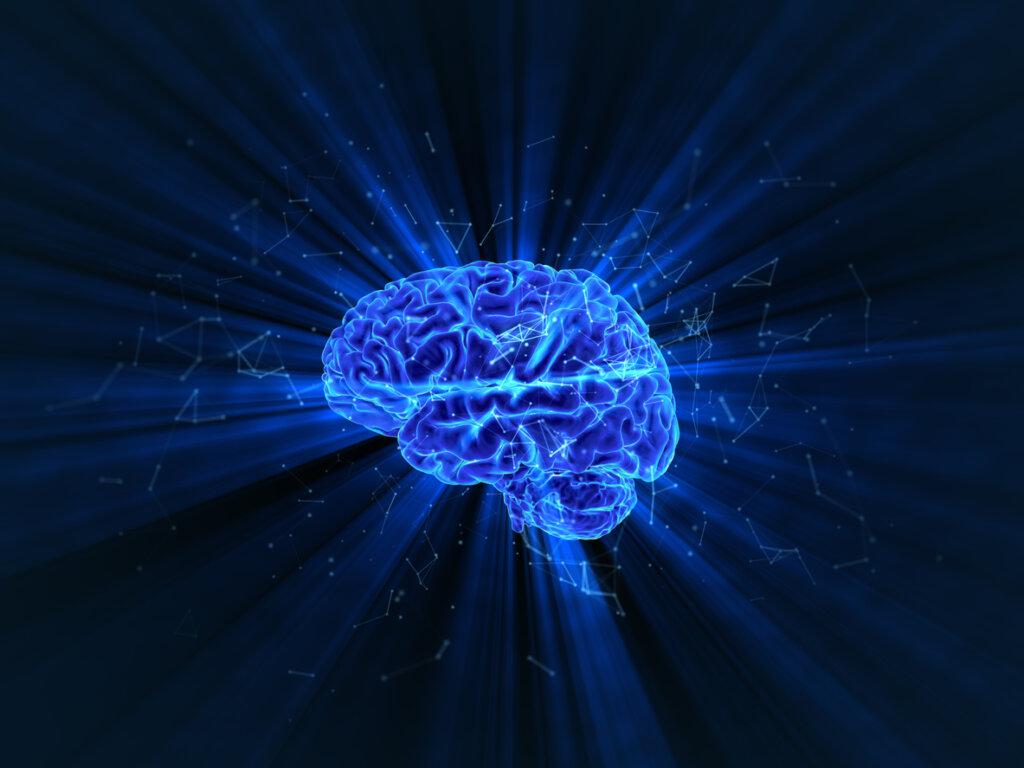The Differences Between REM Sleep and Deep Sleep


Written and verified by the psychologist Valeria Sabater
REM sleep and deep sleep play a fundamental role in your physical and psychological well-being. Nevertheless, it’s quite common to confuse the two and even to think that they appear at the same time. However, nothing could be further from the truth. They differ in many aspects and are so unique in their purposes and characteristics that they’re worth examining in more depth.
Deep sleep is the most restorative of the sleep cycle, while REM is irregular and may not even appear if you take alcohol or certain drugs. Deep sleep favors processes such as growth or tissue repair, while REM opens the door to the world of dreams.
Since you spend almost a third of your life sleeping, you should know what your brain does during that time. It doesn’t matter that you don’t have control over every process that happens during these hours. Understanding it and knowing how to obtain a restful sleep is decisive for feeling good, being productive, learning, remembering, etc.
“Sleep is the golden chain that ties health and our bodies together.”
-Thomas Dekker-

The differences between REM sleep and deep sleep
Rest is divided into two stages. 75 percent of it is NON-REM sleep, and the remaining 25 percent is REM sleep. You start with non-REM sleep, which begins with a small transition phase when you waver between wakefulness and sleep. At this time, it’s really easy to be woken up.
Gradually, you navigate toward the second stage, when your brain waves slow down and your body temperature drops. It’s in the third phase that you finally approach the threshold of deep sleep. This is a period that lasts between 15 and 30 minutes in which your muscles are completely relaxed. Your heart rate and breathing slow and it’s extremely difficult for you to be woken.
From then on, if your rest is sustained, you’ll begin the most significant stages of sleep. We’ll now explain the differences between REM sleep and deep sleep.
They appear at different stages
Deep sleep appears at the third stage, which is also known as ‘the healing stage’. It’s a key moment of your rest since it’s when your brain carries out tasks of decisive importance. Tissues are repaired, cellular energy is restored by eliminating compounds, the work of many of your hormones begins, and learning is established.
REM sleep is the fourth stage and begins approximately 90 minutes after you fall asleep. It’s also called paradoxical sleep because your brain appears to be awake, unlike your body, which remains deeply relaxed. Dreams appear at this stage.
The deep sleep phase is key to cleansing the lymphatic system and removing beta-amyloid plaques and proteins associated with Alzheimer’s disease.
Brain waves differ
One of the differences between REM sleep and deep sleep lies in the brain waves. While in the latter there’s absolute synchronization, REM sleep is characterized by brain waves of lower amplitude and higher frequency, similar to those you have when you’re awake.
In the REM phase, your blood pressure, heart rate, and breathing rise. In addition, your eyes move quickly, whether or not you’re dreaming.
You can live without REM sleep, but not without deep sleep
How do you usually feel when you wake up in the morning? Rested and ready to face the day or drained and exhausted? The quality of your night’s rest depends on whether you’ve been able to spend at least 13 percent of your time in deep sleep. If this isn’t the case, several things can happen:
- Increased risk of developing diabetes and cardiovascular disease.
- Risk of suffering alterations in your mental health. For instance, stress, anxiety, and depression.
- The hippocampus, the region of your brain linked to memory, fails in certain aspects. This means it’s difficult for you to establish new information.
- Not having adequate deep sleep results in tiredness and difficulty in sustaining attention. This seriously affects your quality of life.
However, what about REM sleep? What happens if you don’t reach this stage? Research suggests that REM sleep deprivation in humans for weeks has little effect. Furthermore, it’s interesting to learn that people who take antidepressants find their REM sleep restricted.
The Sleep Research Centre in Surrey, (UK) conducted research that indicated this fact is tolerated quite well. Indeed, they discovered that, while the lack of deep sleep has highly harmful effects, the same doesn’t happen with REM sleep.
REM sleep stimulates the central nervous system. It helps you prepare for waking up.

REM sleep and deep sleep: how to take care of them
A sleep cycle lasts approximately 90 minutes. It’s usual to have between four and six cycles per night. REM sleep and deep sleep aren’t the same, but your general well-being depends, above all, on having sufficient deep sleep. Also, to enjoy an adequate balance between all those stages of the architecture of sleep.
What can you do to take care that each phase is fulfilled and you enjoy a good night’s sleep? Here are some tips:
- Maintain regular routines: go to bed and wake up at the same time.
- Avoid exposure to electronic devices two hours before going to bed.
- Relax with a hot shower before bed.
- Avoid carbohydrates at night (sweets, rice, pasta, etc).
- Sleep hygiene experts claim that the ideal temperature for sleeping is between 18 and 21 degrees.
Finally, never forget the importance of a good night’s rest. Indeed, sleeping well allows you to live better.
All cited sources were thoroughly reviewed by our team to ensure their quality, reliability, currency, and validity. The bibliography of this article was considered reliable and of academic or scientific accuracy.
- Carley, D. W., & Farabi, S. S. (2016). Physiology of Sleep. Diabetes spectrum : a publication of the American Diabetes Association, 29(1), 5–9. https://doi.org/10.2337/diaspect.29.1.5
- Peever, J., & Fuller, P. M. (2016). Neuroscience: A Distributed Neural Network Controls REM Sleep. Current biology : CB, 26(1), R34–R35. https://doi.org/10.1016/j.cub.2015.11.011
- Walker, M. (2017). Why We Sleep: Unlocking the Power of Sleep and Dreams. Scribner: NY, NY.
- Wichniak, A., Wierzbicka, A., Walęcka, M., & Jernajczyk, W. (2017). Effects of Antidepressants on Sleep. Current psychiatry reports, 19(9), 63. https://doi.org/10.1007/s11920-017-0816-4
This text is provided for informational purposes only and does not replace consultation with a professional. If in doubt, consult your specialist.








